
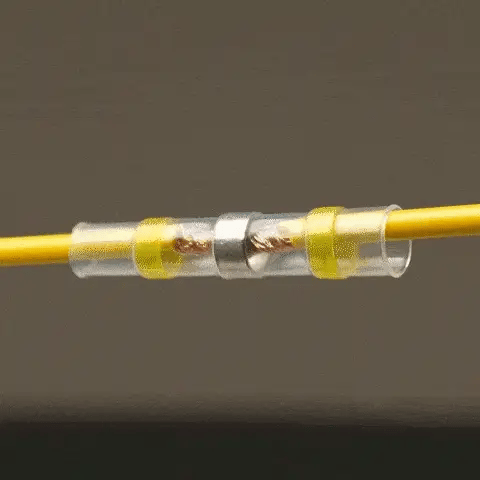



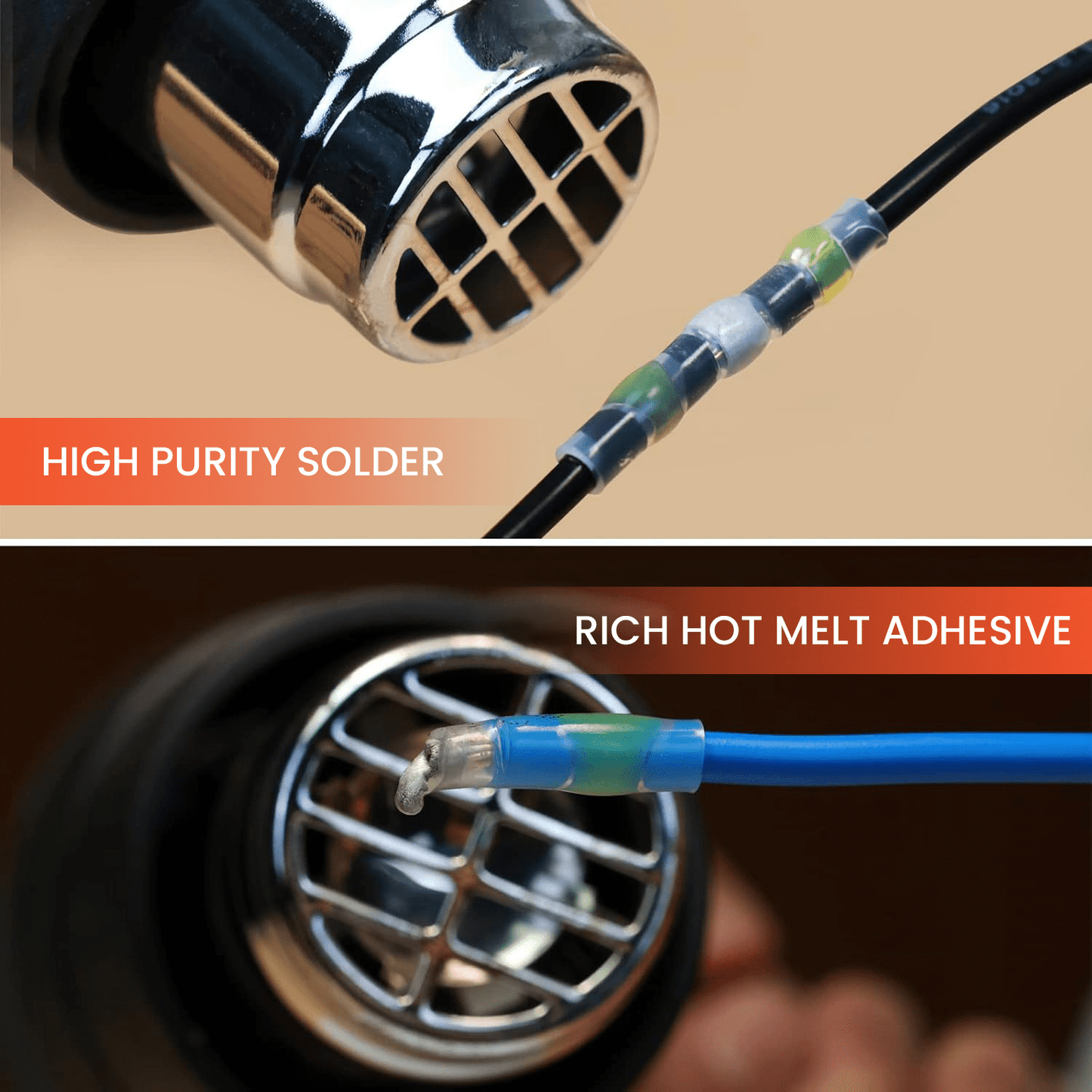
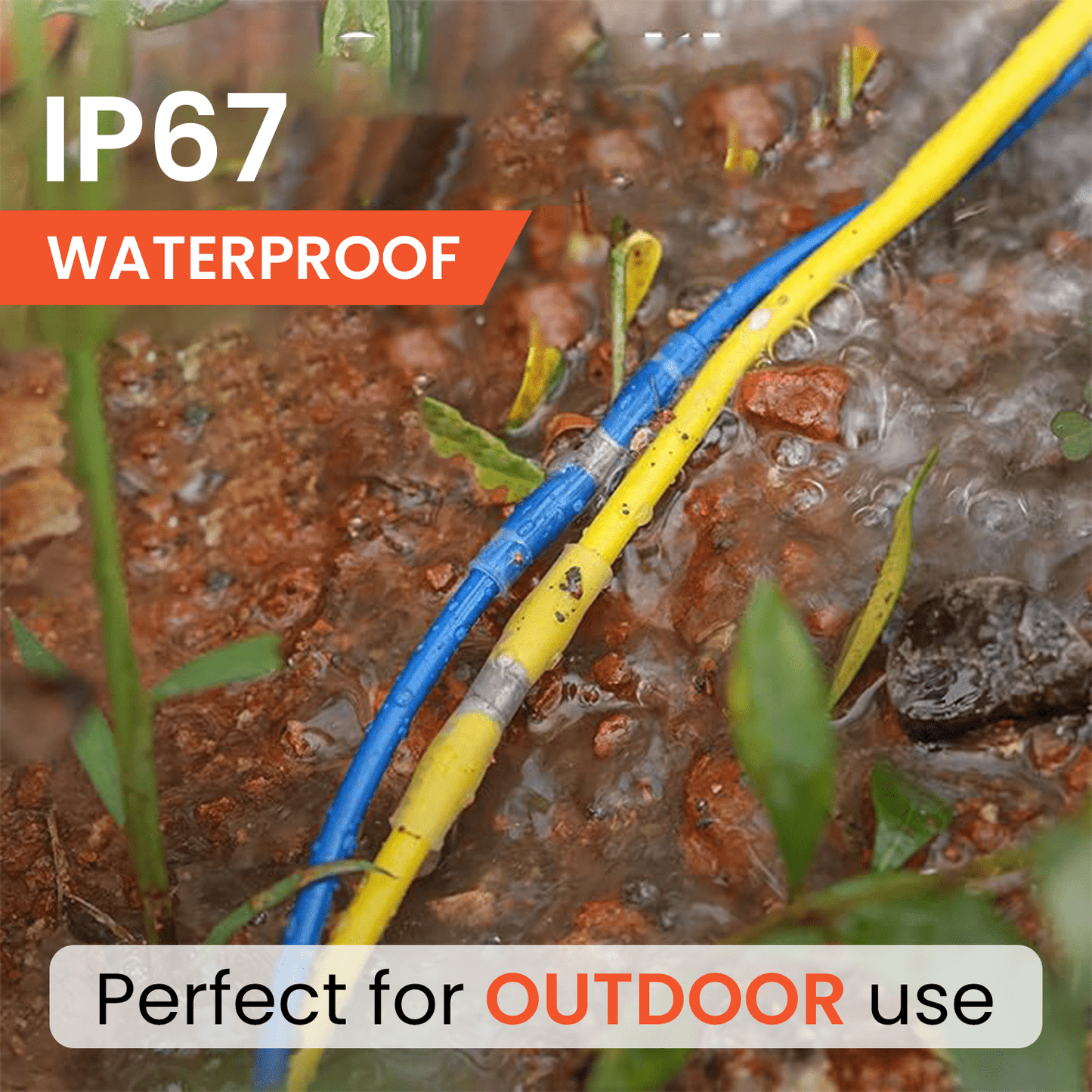
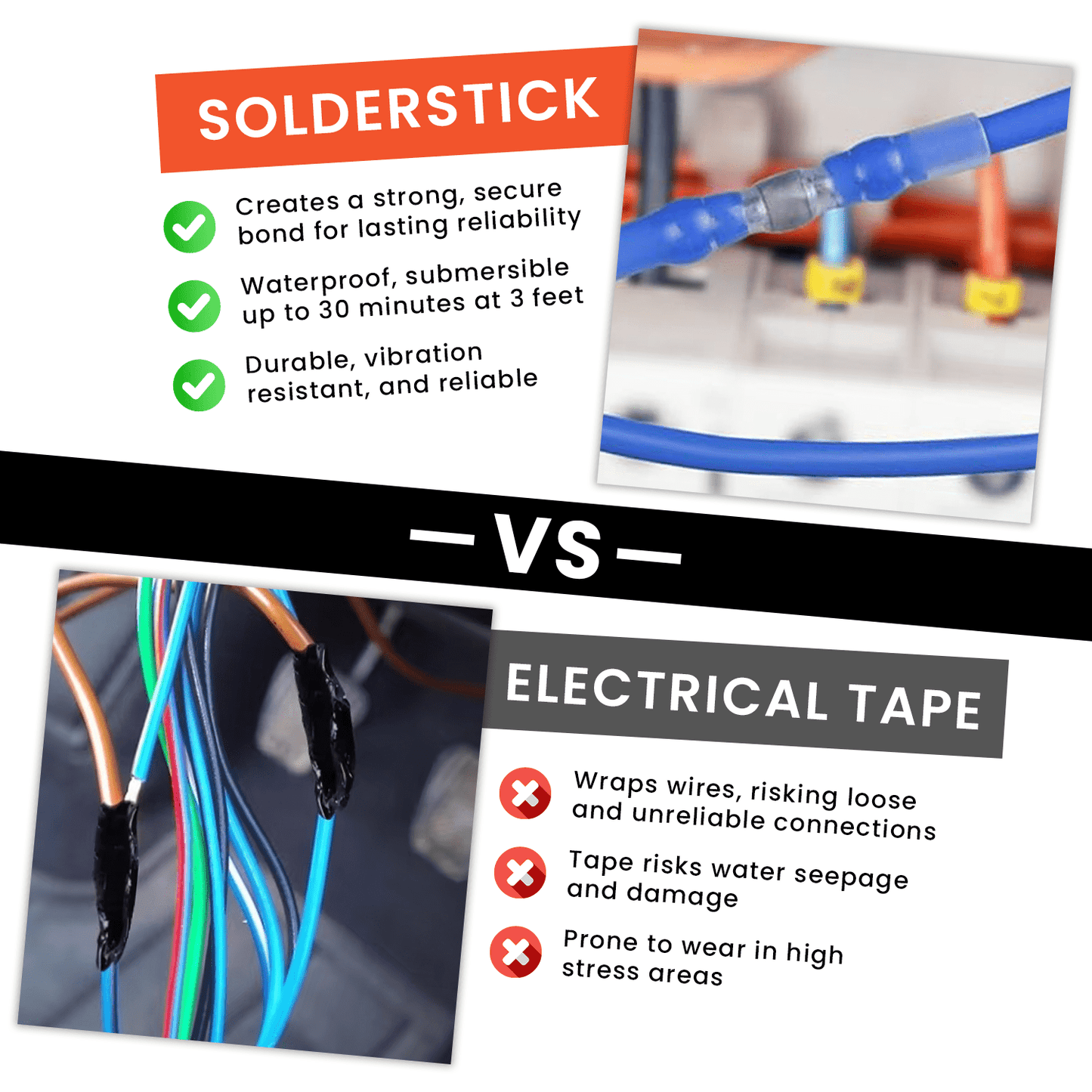
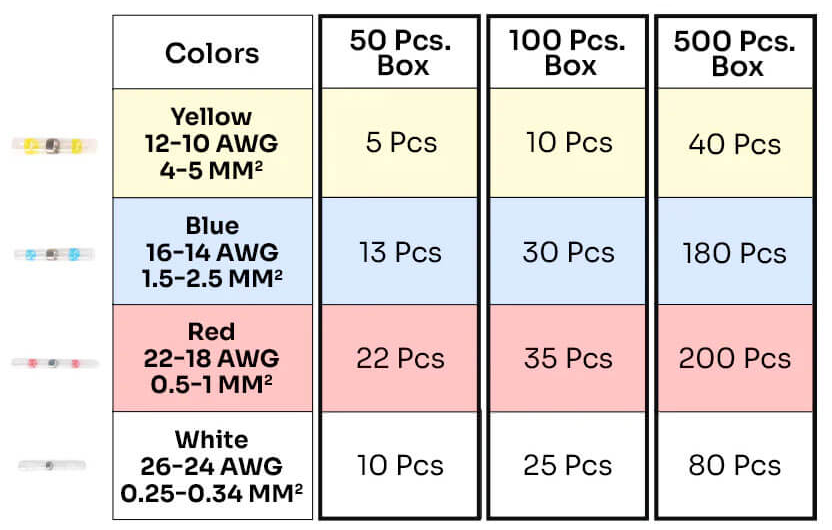








Millions of satisfied users worldwide

Boats

Automobiles

Home Wirings

Audio Systems

Electrical Project

Medical Device Assembly

Minimum Shrink Temp.
80°C / 176°F

Minimum Solder Melting Temp.
138°C / 280°F

Material
Dual-walled polyolefin tubing / Copper

Cable/Wire Sizes
![]() White:
White:
26-24 AWG / 0.25-0.34mm2
![]() Red:
Red:
22-16 AWG / 0.5-1.5mm2
![]() Blue:
Blue:
16-12 AWG / 1.5-2.5mm2
![]() Yellow:
Yellow:
12-10 AWG / 4-6mm2

Boats

Automobiles

Home Wirings

Audio Systems

Electrical Project

Medical Device Assembly

Quick Secure Connections
Perfect for outdoor projects, it keeps your connections safe from moisture and corrosion.

Guaranteed Weatherproof
Its innovative design ensures a secure bond every time, making your projects smooth and efficient.

Easy To Use & Saves Time
Save time and effort with connectors that simplify your tasks without compromising quality.

Enhanced Safety
Reduce burn & hazard risks to ensure a safer working environment, while being 100% safe for electronics.

Fits All Projects
From automotive repairs to home improvements, it’s the go-to solution for any wiring challenge.

Lasting Reliability
With high-quality materials and construction, it delivers reliable connections that stand the test of time.
4 Simple Steps To Seamless Wire Connections
1
Prep Your Cables

Strip your wire insulation 1/3" on both wire ends & twist the strands together.
2
Insert & Connect

Use SolderStick Sleeve to connect the wires together with the right connector size.
3
Heat To Seal

Apply heat with a heat gun, lighter or blow dryer while continuously rotating the wire.
4
Enjoy Durable Connection

Enjoy your secured and waterproof wire connection!
No Guesswork :
Find The Right Size Fast
With our color-coded tubing, picking the right connector for any job is a breeze. Just match your wire to the chart on the box—quick match, no hassle.
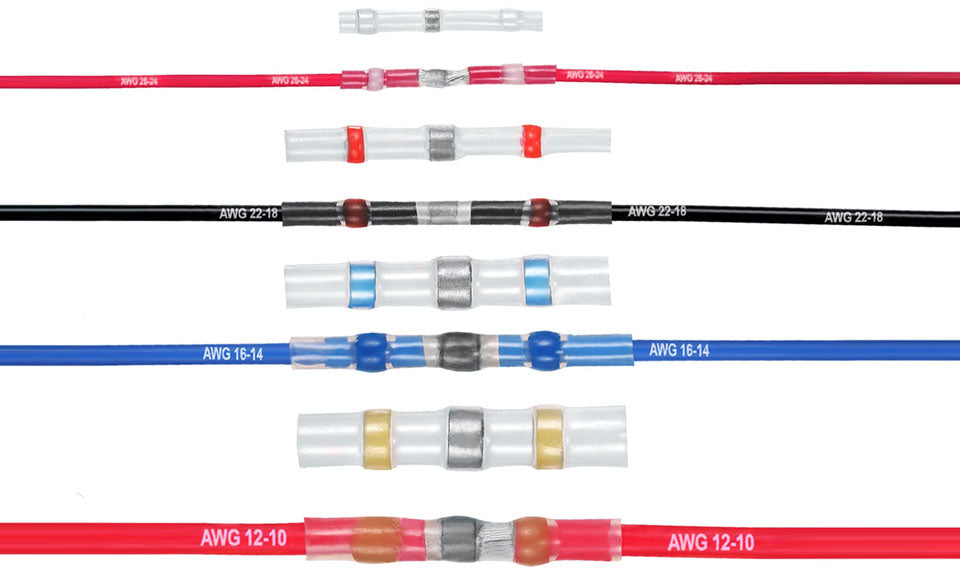

SolderStick Vs Tape
VS

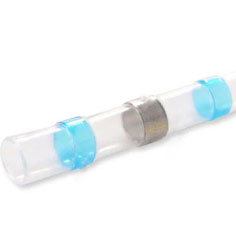
Others
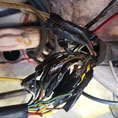
Recommended By
Experts, Pros & DIYers
Our products are backed and used by professionals all around the world.
Find Out Why 50,000 CustomersLove SolderStick
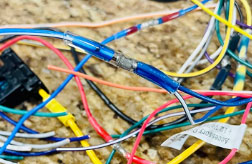
Gabriel
![]() Verified Buyer
Verified Buyer
Using a heat gun they provided and it was super easy to slip it on, twist the wires and slip it back on to solder and seal in one swoop is wicked cool! Very happy! Gave them
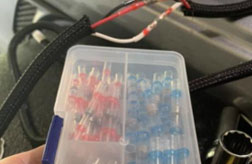
William
![]() Verified Buyer
Verified Buyer
Work excellent! Seal AND solder wires together! I just hit them for about 15 seconds with my heat gun till shrink tube shrunk then solder melted to wire leads...boom, done!
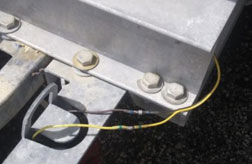
Brad
![]() Verified Buyer
Verified Buyer
This solder sleeve works exactly how it is described & kills two birds with one stone of soldering wire as well as sealing the connection. It is a huge time-saver.
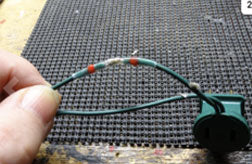
Kevin
![]() Verified Buyer
Verified Buyer
After about 5 seconds the rubber material started to shrink. At about 9 seconds the solder started to melt & bond the wires. I gave the wires a firm tug & there were super tight.
Frequently Asked Questions
A solder wire connector is a heat shrink tube with a low-temperature solder ring in the middle. It connects solder wires without the need for specialized tools.
Both sides of the solder ring have a ring of heat-activated adhesive that creates a seal when heat is applied.
You can get it here. Simply select the kit size and color, and you are done! We will ship single-size wire connectors depending on the connector size you pick.
The Solderstick waterproof solder wire connector kit includesvarious sizes of solder wire connectorsdesigned to create waterproof and durable wire connections.
You can definitely use a small butane or propane torch instead of a heat gun! However, you should not get it too close since you can over-melt the shielding if you are not careful.
Absolutely! Whether you are working with copper, aluminum, or a mix of materials, SolderStick connectors are designed to provide a strong, reliable connection across a variety of wire types.
Yes, these connections are weatherproof. However, remember to heat both ends of the sleeveto create a lasting watertight seal.
SolderStick connectors can accommodate wire sizes up to 10 AWG. For specific projects, refer to our sizing chart to find the perfect fit for your needs.
Yes, if you keep a reasonable distance from the exhaust components(such as pipes, manifolds, and turbo), then these are an excellent choice since they will keep the joint dry and make it far less susceptible to corrosion under the hood.
Yes, Solderstick connectors are also ideal for outdoor use! Our waterproof design ensures connections stay protected against the elements, making them perfect for garden lighting, outdoor sound systems, and more.
Our shipping typically takes 3-5 business days in the USA and 7-10 business days in other parts of the world.
If you are not completely satisfied, we are here to make it right.
We stand behind our products with a 90-day money-back guarantee.
Plus, our customer support team is always ready to assist with any questions or concerns.
Discover the ultimate solution for all your wiring needs with the SolderStick waterproof wire connector kit.
Engineered to connect wires securely in any environment, this kit is perfect for a range of applications—from automotive wiring and marine electronics to landscape lighting and outdoor projects.
It is designed to work with various wire types and building wire installations. Furthermore, it can even provide you with a corrosion-resistant connection that delivers reliable performance even in wet conditions.
Our connectors have consistently shown excellent performance in durability and ease of use,m making them a top choice for electrical projects.
Below are the product features of our waterproof solder wire connector kits.
Complete Kit:
Our kits come in stock with up to 500 pieces of waterproof wire connectors in different sizes.
This comprehensive set is ideal for numerous projects, ensuring you have the right connector to add to your toolbox—whether you’re tackling building wire projects or enhancing your landscape lighting.
Color-Coded:
Our wire connectors are available in four distinct colors, making it simple to sort and choose the right wire type for any job. They come in white (AWG 26-24), red (22-16 AWG), blue (16-12 AWG), and yellow (12-10 AWG).
This color-coding system is designed to help you connect wires quickly and accurately, whether you're working with automotive wiring, building wire, or even delicate sound systems.
Quick and Easy Connection:
Once you have prepped your wires, you only need a good heat source to connect them. The integrated low-temperature solder melts as you heat, while the seal created by the connector ensures a secure, waterproof bond.
This means your connections are not only fast to complete but also resistant to corrosion and other signs of wear, making them ideal for high-voltage or sensitive electronics.
Can Be Used By Anyone:
SolderStick’s waterproof solder wire connectors are designed for both professionals and DIY enthusiasts.
This item is versatile enough to use in various scenarios—from home electrical projects to industrial equipment—ensuring a reliable connection that stands up to harsh conditions.
No special tools or expertise are required so you can work confidently on any project.
Reliable Performance:
Our waterproof wire connectors guarantee a secure and long-lasting connection once properly sealed.
Built to withstand vibration, temperature fluctuations, and wet environments, these connectors perform reliably whether you’re dealing with building wire installations or delicate landscape lighting setups.
The SolderStick waterproof solder wire connector kit can be used in various applications, including:
Automotive Wiring: Perfect for connecting and repairing car electrical systems, these waterproof wire connectors ensure that high-voltage connections remain safe and free from corrosion, even under high-vibration conditions.
Marine Electronics:
Designed for wet and harsh environments, these connectors protect against water ingress and corrosion, making them ideal for marine applications.
Home Electrical Projects:
Simple enough for DIY enthusiasts, our connectors are great for domestic electrical projects. They’re perfect for landscape lighting installations, where a secure and waterproof connection is essential.
Industrial Equipment:
With a robust design, these connectors are durable enough for use in professional settings and with heavy-duty building wire.
Lighting Installations:
Whether indoors or outdoors, waterproof wire connectors provide safe and stable connections that are essential for landscape lighting and other illumination projects.
DIY Projects & Sound Systems:
The ease of use and reliable performance of these connectors make them a top choice for a variety of DIY projects and sound system installations where consistent connectivity is a must.
HVAC Systems & Outdoor Projects
These connectors provide secure, corrosion-resistant connections in HVAC systems and other outdoor applications, ensuring efficient operation even in wet conditions.
To keep your waterproof wire connectors performing at their best, follow these best practices for installation, long-term care, and troubleshooting:
Proper Installation
Always ensure that the wires you connect are clean and stripped to the recommended length. For both building wire and various wire types used in landscape lighting or industrial applications, proper preparation is key.
Use a good heat source (heat gun, lighter, or blow dryer) to evenly melt the low-temperature solder inside the connector.
This step is critical to form a secure, waterproof bond that resists corrosion, even in wet environments or during high-voltage applications.
Safety Tips
When connecting wires, work in a well-ventilated area and keep your protective gear on.
Avoid overheating the connectors, as excessive heat can cause the silicone sealant—or the adhesive rings in some models—to break down, leading to unreliable connections.
Furthermore, always handle the item with care to prevent accidental burns or damage, especially when working with sensitive electrical components.
Remember, safety comes first when working with any wiring or connectors.
Troubleshooting Steps
If a connection isn’t sealing properly, check that you’re using the correct connector size for your wire type. Verify that the connector is within the stock and not a mismatched grade compared to your building wire requirements.
Look for signs of underheating or overheating, and adjust your heat source accordingly.
If corrosion is visible or the bond appears weak, consider re-insulating the connection with additional silicone sealant or replace the connector with a fresh waterproof wire connector to ensure a stable, long-lasting connection.
Here are some more SolderStick products and collections you can check out:
T-Tap Wire Connectors | Waterproof Wire Connectors | Heat Guns for Soldering | Wire Nut Kits | Wire Connectors | Butt Connectors | Ring Terminals | LED Connector | Wire Crimping Tool | Wire Eyelet Connectors | Fork Connector Kit | Spade Connectors | Copper Cable Lug | Push-In Terminal Block Wire Connector | Piggyback Space Connector Kit | Colored Heat Shrink Tubing | Bullet Wire Connector | Ferrule Connector Kit